
Global NEST Journal
Scope & Guideline
Advancing knowledge for a sustainable future.
Introduction
Aims and Scopes
- Environmental Remediation:
Research aimed at developing and assessing methods for the removal or neutralization of pollutants from various environmental media, including air, water, and soil. - Sustainable Waste Management:
Studies focusing on innovative techniques and practices for managing waste materials, including recycling, composting, and the development of bio-based materials. - Climate Change and Carbon Management:
Investigations into the impacts of climate change and strategies for reducing greenhouse gas emissions, including carbon capture technologies and carbon footprint analysis. - Water Quality Assessment:
Research dedicated to monitoring and improving water quality through various methods, including chemical treatments, ecological approaches, and advanced filtration technologies. - Renewable Energy Solutions:
Exploration of alternative energy sources and technologies, including biofuels, solar energy, and waste-to-energy systems, aimed at reducing reliance on fossil fuels. - Ecotoxicology and Biodiversity:
Studies assessing the effects of pollutants on ecosystems, species interactions, and biodiversity, emphasizing the importance of preserving ecological integrity.
Trending and Emerging
- Nanotechnology in Environmental Remediation:
There is an increasing focus on the use of nanomaterials for environmental remediation, showcasing innovative approaches to pollutant degradation and removal. - Digital Solutions for Environmental Monitoring:
The rise of digital technologies, including IoT and machine learning, is being leveraged for real-time environmental monitoring and pollution prediction, indicating a trend towards data-driven approaches. - Circular Economy Practices:
Research is increasingly exploring circular economy principles, emphasizing resource efficiency, waste reduction, and sustainable production processes. - Eco-friendly Materials Development:
Emerging studies are focusing on the development of eco-friendly materials derived from waste, promoting sustainable construction and product design. - Microbial and Biochemical Approaches:
There is a growing interest in utilizing microbial processes for waste treatment and bioremediation, reflecting a shift towards nature-based solutions.
Declining or Waning
- Traditional Waste Treatment Methods:
There appears to be a waning interest in conventional waste treatment methods, as newer, more innovative approaches gain traction. Research is increasingly focused on sustainable and environmentally friendly alternatives. - Chemical Pesticide Remediation:
Research on the remediation of chemical pesticides has decreased, possibly due to a growing emphasis on integrated pest management and the use of biopesticides. - Heavy Metal Contamination Studies:
Although still relevant, studies specifically focused on heavy metal contamination without integrating broader environmental impacts and remediation strategies are becoming less frequent. - Soil Pollution Studies:
Research specifically targeting soil pollution, while important, is being overshadowed by more comprehensive studies that integrate soil health with water and air quality assessments.
Similar Journals
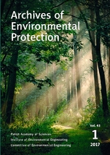
Archives of Environmental Protection
Innovative Insights for a Sustainable FutureArchives of Environmental Protection, published by the Polish Academy of Sciences, is a pivotal journal in the field of Environmental Science. With an ISSN of 2083-4772 and E-ISSN of 2083-4810, this journal serves as a critical platform for disseminating innovative research and comprehensive reviews that address the complexities surrounding environmental issues. As of 2023, it holds a respectable Q3 ranking in Environmental Science, reflecting its relevance and contribution to the academic community, indicated by a Scopus rank of 124 out of 233 in the General Environmental Science category. Although it operates without Open Access, the journal's consistent publication from 2007 to 2024 emphasizes its commitment to advancing knowledge in diverse areas of environmental protection. Researchers, professionals, and students are encouraged to engage deeply with the wealth of insights offered through the rigorous peer-reviewed articles presented in this journal, which strive to foster sustainable practices and environmental stewardship.
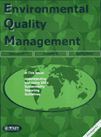
ENVIRONMENTAL QUALITY MANAGEMENT
Bridging Disciplines for Enhanced Environmental QualityENVIRONMENTAL QUALITY MANAGEMENT is a respected journal published by WILEY, focusing on interdisciplinary studies that merge environmental science with public health, management, policy, and law. Since its inception in 1991, this journal has provided a platform for researchers and practitioners to share innovative insights and advancements in understanding environmental quality and its impacts on human health and the ecosystem. With an ISSN of 1088-1913 and an E-ISSN of 1520-6483, it holds a significant position in the academic community, evidenced by its presence in the Q3 quartile across several categories, including Management, Monitoring, Policy and Law, as well as Pollution and Waste Management. Although it is not an open-access journal, it continues to be a vital resource for those in the environmental sector, offering robust evaluations and discussions that advance knowledge and foster improved practices. With Scopus rankings demonstrating its relevance among other titles in the field, ENVIRONMENTAL QUALITY MANAGEMENT plays a crucial role in shaping discourse and informing policy in an increasingly vital area of study.
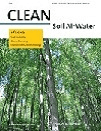
CLEAN-Soil Air Water
Championing Open Access for Environmental AwarenessCLEAN-Soil Air Water, an esteemed journal published by Wiley, serves as a vital platform for disseminating research in the fields of environmental chemistry, pollution, and water science and technology. Operating under an Open Access model, it embraces the principles of knowledge sharing, making significant research findings readily accessible to a global audience. With an ISSN of 1863-0650 and an E-ISSN of 1863-0669, the journal has demonstrated its importance in the academic community, reflected in its Scopus rankings within the top quartiles of its categories. Established in 2007 and continuing through to 2024, CLEAN-Soil Air Water offers researchers, professionals, and students an opportunity to explore innovative studies that address pressing environmental challenges, facilitating an exchange of novel ideas and techniques essential for sustainable development. With a publication footprint in Germany and a growing international reputation, this journal is an invaluable resource for those dedicated to advancing the science and practices of environmental stewardship.
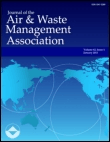
JOURNAL OF THE AIR & WASTE MANAGEMENT ASSOCIATION
Transforming Knowledge into Action for Environmental ExcellenceJOURNAL OF THE AIR & WASTE MANAGEMENT ASSOCIATION is a leading publication in the fields of environmental science, pollution control, and waste management, published by Taylor & Francis Inc in the United Kingdom. With an impressive history of publication dating back to 1989 and a commitment to advancing knowledge and practice in these critical areas, this journal serves as a valuable resource for researchers, professionals, and students alike. It holds a 2023 impact factor reflected through its competitive rankings in four distinct categories: Q3 in Atmospheric Science and Q2 in Management, Monitoring, Policy and Law, Pollution, and Waste Management and Disposal. The journal's dedication to disseminating innovative research and best practices plays a vital role in enhancing environmental policies and strategies globally. Although not currently Open Access, the journal is accessible through its ISSN 1096-2247 and E-ISSN 2162-2906, providing opportunities for rich academic discussion and collaboration in addressing pressing environmental challenges.

Environmental Engineering and Management Journal
Driving change through impactful research and collaboration.Welcome to the Environmental Engineering and Management Journal, a pivotal platform for disseminating knowledge and innovative research in the fields of Environmental Engineering, Management, Monitoring, Policy, and Law. Published by GH Asachi Technical University of Iasi in Romania, this journal has been committed to fostering discussions and advancements in environmental solutions since its inception in 1988, with continuous publication from 2002 to 2024. While classified in the Q4 category across various environmental disciplines in 2023, it remains an important resource for scholars and practitioners navigating the complexities of pollution and environmental management. With an ISSN of 1582-9596 and an E-ISSN of 1843-3707, this journal encourages submissions that address pressing ecological challenges and provide actionable insights. Although currently not open access, it seeks to expand its reach and relevance within the global academic community. Join us as we explore critical environmental issues and contribute to sustainable practices worldwide.
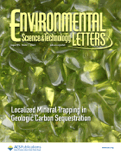
Environmental Science & Technology Letters
Leading the charge in ecological innovation and sustainability.Environmental Science & Technology Letters, published by the American Chemical Society, stands as a premier journal in the realm of environmental science and technology, focusing on pivotal studies that address pressing environmental challenges. With an impressive Q1 ranking in multiple categories including Ecology, Environmental Chemistry, and Pollution, this journal maintains a position of excellence within its field, achieving Scopus ranks that place it in the top percentile of Environmental Science disciplines. Although not open access, Environmental Science & Technology Letters offers vital insights and cutting-edge research that contribute significantly to the understanding and management of environmental issues. The journal’s objectives include disseminating ground-breaking findings and promoting discussions that lead to sustainable solutions. With convergence from 2013 to 2024, it continues to serve as an essential resource for researchers, professionals, and students committed to advancing knowledge and innovation in environmental science.

Advances in Environmental Research-An International Journal
Championing Insights for Global SustainabilityAdvances in Environmental Research is an international journal published by TECHNO-PRESS, dedicated to advancing our understanding of environmental science and sustainability. Operating with an ISSN of 2234-1722 and an E-ISSN of 2234-1730, this journal serves as a premier outlet for researchers, professionals, and students aiming to share pioneering research findings, case studies, and reviews that address contemporary environmental challenges. The journal aims to provide a platform for scholarly discussion on a wide range of topics, including pollution control, resource management, and ecological conservation. Though currently classified as a non-open access journal, it remains accessible through various institutional subscriptions, allowing a broad audience to engage with its content. Committed to fostering academic collaboration and innovation, Advances in Environmental Research plays a crucial role in informing policymakers and the scientific community about emerging trends and solutions in environmental studies, making it an essential resource for those dedicated to creating a sustainable future.

ENVIRONMENTAL SCIENCE AND POLLUTION RESEARCH
Connecting Science to Solutions for Pollution ChallengesEnvironmental Science and Pollution Research is a premier international journal published by Springer Heidelberg, dedicated to advancing knowledge in the field of environmental science and pollution. With an impressive impact factor reflecting its vital contributions to research, the journal is categorized in the top quartiles (Q1 and Q2) across several domains, including Health, Toxicology and Mutagenesis, and Environmental Chemistry. Established in 1994, it continues to be a critical resource for researchers, professionals, and students focusing on pressing environmental issues. The journal provides an insightful platform for disseminating significant findings related to pollution and its effects on health and the environment, contributing to a better understanding and resolution of these challenges. While it currently does not offer Open Access options, its inclusion in prominent rankings, such as the Scopus rankings, underscores its reputation and influence within the scientific community.
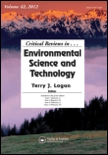
CRITICAL REVIEWS IN ENVIRONMENTAL SCIENCE AND TECHNOLOGY
Leading the Way in Environmental Scholarship and InnovationWelcome to CRITICAL REVIEWS IN ENVIRONMENTAL SCIENCE AND TECHNOLOGY, an esteemed journal published by Taylor & Francis Inc. This journal has been at the forefront of environmental research since its inception in 1993, spanning a wide range of disciplines including environmental engineering, pollution control, waste management, and water science. CRITICAL REVIEWS holds an impressive Q1 ranking in multiple categories, including Environmental Engineering and Pollution, demonstrating its critical role in advancing knowledge within the field. With a remarkable Scopus ranking—placing it in the top 1% for Environmental Science categories—this journal serves as an invaluable resource for researchers, professionals, and students alike, providing comprehensive reviews and analyses that catalyze innovative solutions to pressing environmental challenges. Though currently not open access, the journal's content is accessible through various academic platforms, ensuring that cutting-edge research is available to a global audience. Join the community of scholars dedicated to enhancing our understanding of environmental science and technology through rigorous investigation and critical discourse.

Journal of Environmental Science and Management
Innovating solutions for sustainable management practices.Journal of Environmental Science and Management, published by the University of the Philippines Los Baños College, serves as a vital platform for disseminating research findings and innovations in the field of environmental science and management. With an ISSN of 0119-1144, this journal aims to foster multidisciplinary discussions and advancements in sustainability practices and environmental policy, primarily focusing on the unique challenges faced in the Philippines and similar ecological contexts. Despite being categorized in the Q4 quartile for Environmental Science (miscellaneous) and holding a SCOPUS rank of #191/233, it provides crucial insights and practical solutions for a diverse audience ranging from researchers to policymakers. While it does not currently operate under an open-access model, its commitment to quality research continues to make it a notable source in the environmental science community. The journal covers a broad timeframe from 2011 to 2024, capturing evolving dynamics in the environmental landscape. Contributing to this journal not only enhances the visibility of local and regional environmental research but also aids in addressing global environmental challenges.